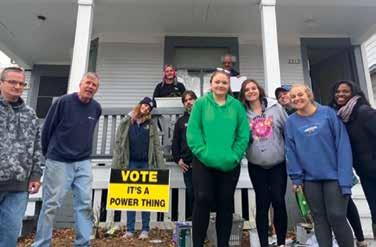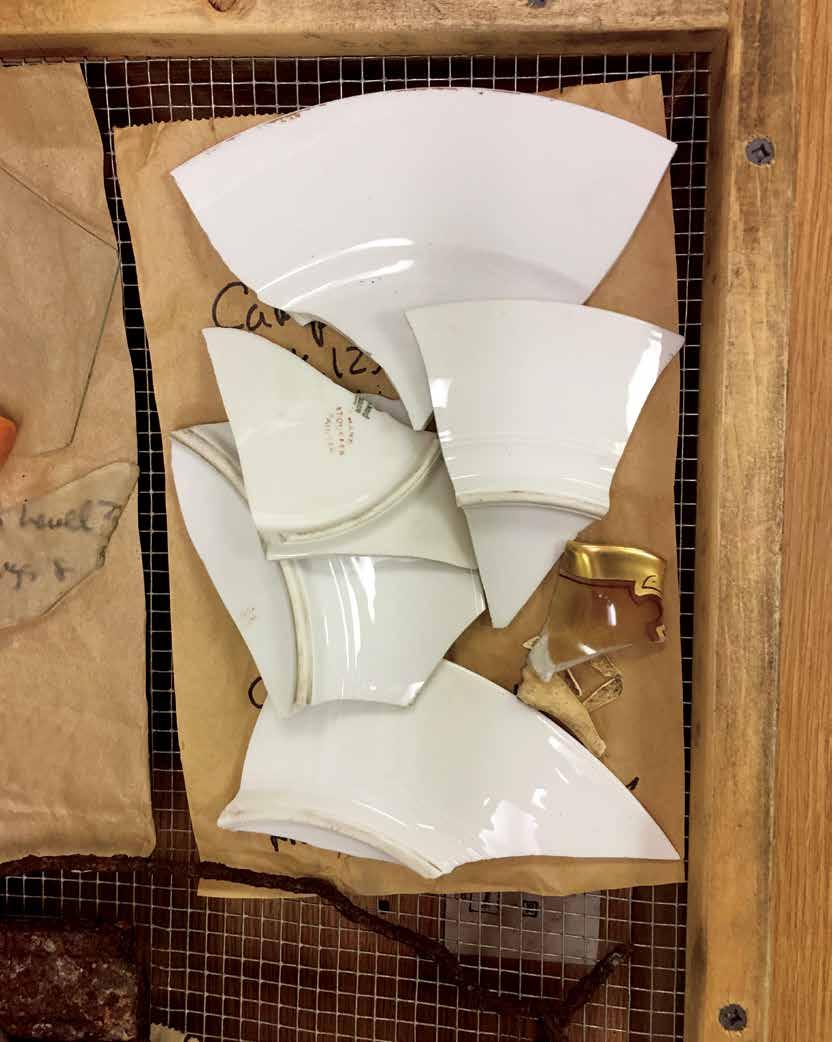
7 minute read
IN PURSUIT OF JUSTICE A psychology course’s internships provide students with real-world experiences while tackling community challenges
IN PURSUIT OF JUSTICE
In Pursuit of Justice
Psychology course internships provide students with real-world social justice experiences while tackling community challenges along the way.
By Jennifer Anderson
Esme Lezama Ruiz, a psychology major, has given a lot of thought to her future. She’s made plans for graduate school, and after that she wants to earn a doctorate in forensic psychology and work for the FBI. But for all her carefully formulated goals, Ruiz felt that the part of her plan that was missing was real-world experience. This is where the yearlong Field Studies course helped round out Ruiz’s résumé and give her a chance to take up Marquette’s challenge to all of its students to become men and women for others.
For the past seven years, Dr. Ed de St. Aubin (left), associate professor of psychology, has thoughtfully developed a number of internships with nonprofit organizations throughout
Milwaukee, internships where Marquette students come face-to-face with many of the most challenging issues facing the city. Doing much more than making coffee and taking out the trash, students in Field Studies work alongside community leaders doing meaningful work and make deep personal connections in the process.
Above: Field Studies interns at The Family House, a transitional living facility that is part of Table of the Saints, a nonprofit that serves men coming out of prison.
—FRANCISCO TEJEDA
Last year, Ruiz (left) interned at the Sojourner Family Peace Center, Wisconsin’s largest nonprofit provider of domestic abuse prevention and intervention services. There she worked within its Beyond Abuse program, comprised of group education sessions for women who have been physically abusive and want to develop the skills to stop. “These women are trying so hard to become better for themselves and for their families,” Ruiz remarks. “Many of them had been dealt such an unfair hand and had developed a lot of unhealthy coping mechanisms.”
As part of her internship, Ruiz helped to facilitate a three-day retreat for the Beyond Abuse members, an experience she calls “intense” but invaluable for helping her gain an understanding of how she could best be of service to these women.
“Most of them just needed someone to listen to them,” she adds. “I got to be that person.”
The Field Studies course currently includes five nonprofit organizations and internships for 17 students. Students are matched with an organization for which they work eight hours per week and are paired with a mentor there who can work closely with them throughout the year. Students also meet weekly with de St. Aubin to discuss what they’re working on and what they’re learning. He also has students read relevant content and write frequent reflections on their work.
Francisco Tejeda interned at Project Return, a 40-year-old Milwaukee organization that helps ex-inmates find stability. Theexperience has been eye-opening, and Tejada has been struck by the difficult challenges these men face when they return to life after incarceration.
“It’s been humbling,” Tejeda says. “These are people who are a lot less fortunate than I am, and it’s made me feel compelled to do something and not just turn a blind eye.”
The experience with Project Return clients impressed upon Tejada the importance of addressing issues of mental health, especially in minority communities where the issue is often neglected. Tejada (left), a cognitive science major, has subsequently added a psychology major in hopes of becoming a therapist. “The mental health needs of inmates are often neglected,” Tejeda says. “The prison experience needs to be much more rehabilitative than debilitative. It’s not working if people leave worse than when they came in.”
Marquette intern Casey Kleeman has become deeply engaged in Table of the Saints, a small, faith-based group that runs Family House, which provides temporary housing for men coming out of prison. Kleeman organized the group’s monthly “Let’s Talk About It” meetings. Open to anyone in the community, these meetings bring in professionals to cover stigmatized issues such as depression and addiction.
Kleeman hopes to work in criminal justice social work either in reintegration services or victim advocacy. “It’s been great to have an experience in the field before graduation,” said Kleeman (left) in a Riverwest Radio interview. “Having the chance through Marquette and through [Dr. Ed de St. Aubin] to try this out before we get into the real world has been invaluable.” De St. Aubin has also arranged for Marquette students to intern at EXPO (EX-Incarcerated People Organizing), an advocacy group focused on changing the laws that pertain to former felons and led by men and women who have been previously incarcerated. In addition, de St. Aubin has installed interns who help develop dossiers on parolees, attend sessions between parolees and the judge, and collect data and evidence on high-risk cases in Milwaukee’s U.S. Probation and Parole Office.
The Field Studies internship program continues to grow as students learn of the unique real-world opportunities it can offer and as area nonprofits learn of the free skilled labor they can access. De St. Aubin plans to add internships in the areas of local LGBTQ organizations, as well as with faith leaders who focus on social justice issues. Building the course over the years has clearly been a labor of love for de St. Aubin.
“I’m lucky that I’m a professor, so I know how fabulous 20-year-olds are,” de St. Aubin says. “I get to watch their growth over the year, and it’s really a privilege to witness.”
Reflecting on Perceptions
Philosophy course immerses students into the lived experiences of incarcerated people through virtual collaborative course work.
By Jennifer Anderson
An ambitious new philosophy course, Engaging Mass Incarceration: Freedom, Justice and the Arts, brings the study of philosophy to an unusual mix of scholars: Marquette Honors Program students and inmates within area correctional facilities. Co-taught by
Dr. Theresa Tobin, Marisola Xhelili
Ciaccio, a doctoral student in philosophy, and James Mahmood Watkins, a community subject matter expert, the course is designed for both sets of students to “work collaboratively and individually to reflect on and critically examine how social identity and social situatedness influence our perceptions, beliefs, judgments, emotional experience and knowledge,” Tobin explains.
The class comprises 25 Marquette undergraduates and coordinates with a
Milwaukee Area Technical College online course whose enrollees are incarcerated.
As part of the course work, all students are divided into small groups to focus on a single location in Milwaukee that has history and meaning for one of its members, such as a park or intersection.
The collaboration between the Marquette and MATC students is achieved virtually.
The Marquette students photograph that spot, and each student in the course writes and shares an individual reflection on it. Marquette students then research the space, collecting empirical data such as crime statistics, area school funding and amount of green space. They also interview a person living in the area. As part of the university’s commitment to “engaging social systems and values” throughout its core level courses, this class is designed “to be as community immersive in Milwaukee as possible,” says Tobin, Arts ’97, associate professor of philosophy. “The idea is for students to ask after themselves ‘How does knowledge, both of data and other people’s lived experiences of a place, confirm or refute my perception?’” Xhelili Ciaccio says. The Center for the Advancement of the Humanities sponsored Watkins’ participation in the program, an addition that Tobin calls “vital to the success of the course.” Formerly incarcerated, Watkins now works on issues of prison reform and restoration of prisoners’ rights. “People don’t see the incarcerated as still a part of the fabric of our community,” Watkins says. “When you educate someone, you appeal to the humanity in them, and in turn, hopefully they will recognize the humanity in others.”
Drs. Theresa Tobin; Robert Smith, Harry G. John Professor of History; and Darren Wheelock, associate professor of social and cultural sciences, were named the 2020 Way Klingler Teaching Enhancement Award recipients. Working with Xhelili Ciaccio, who co-founded this course, the award supports their project, Bringing Mass Incarceration into the Classroom: Expanding the Blended Course Model, which brings Marquette students and current/former incarcerated students into the classroom together.

REMAINS OF THE DAY By Ann Christenson, CJPA ’91






